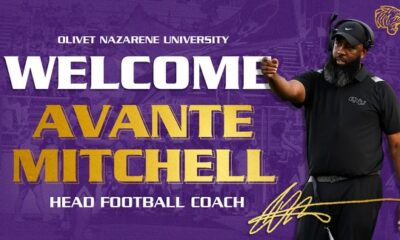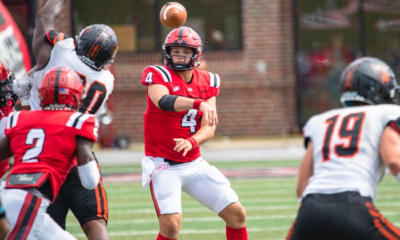
January 13, 2024 – Tuscaloosa, AL –
In a move that marks a significant shift in college football’s coaching landscape, Kalen DeBoer has been announced as the new head coach for the University of Alabama’s football team. This appointment is not just another routine coaching change; it represents a remarkable journey for DeBoer, a testament to his exceptional coaching abilities and a signal of changing tides in the world of college football coaching.
DeBoer’s roots are far from the usual breeding grounds of top-tier college football coaches. His career, notably kick-starting at the NAIA level with Sioux Falls, has been a blend of consistent success and gradual ascension through the ranks of college football. At Sioux Falls, DeBoer achieved an incredible record, showcasing his prowess in team building and strategy. His journey through various roles, from Southern Illinois to Washington, has been marked by impressive turnarounds and significant improvements at each stop.
His most recent stint before joining Alabama was with the University of Washington, where he continued to bolster his reputation as a transformative coach. Under his guidance, Washington saw remarkable success, culminating in a bid for the National Championship. This trajectory is a testament to DeBoer’s skill in not only understanding the game of football but also in instilling a winning mentality in his teams.
DeBoer’s appointment as the head coach of a prestigious program like Alabama is a significant milestone in his career. It also serves as an inspiration to coaches at smaller programs and highlights the potential for success regardless of one’s starting point in the coaching world. The University of Alabama, known for its rich football history and high expectations, presents a new challenge for DeBoer. It’s a challenge that, given his track record, he seems more than equipped to handle.
This move is also reflective of a broader trend in college football, where success and talent are being recognized and rewarded, irrespective of the traditional power structures and hierarchies. DeBoer’s rise through the ranks, culminating in taking the helm at one of the most storied programs in college football, underscores this shift.
As Kalen DeBoer steps into this new role, all eyes will be on how he translates his unique experiences and strategies to the high-pressure environment of Alabama football. His journey from the NAIA to the University of Alabama is not just a personal achievement but a narrative of hard work, adaptability, and the ever-evolving nature of college football coaching.
Kalen DeBoer’s journey to the pinnacle of college football began in the less spotlighted world of the NAIA, where he laid the foundation of his coaching career with an extraordinary record of success. This phase of DeBoer’s career is not just a story of wins and losses; it’s a narrative about building a winning culture from the ground up and the kind of tenacity it takes to ascend from small college football to the national stage.
DeBoer’s early coaching career took root at his alma mater, the University of Sioux Falls, a small NAIA school. His initial role was that of a wide receivers coach, a position he secured immediately after graduating. This role marked the beginning of a journey that would see him become one of the most successful coaches in NAIA history. DeBoer’s deep understanding of the game, combined with his unique ability to connect with and inspire his players, quickly set him apart.
In 2005, DeBoer ascended to the head coaching position at Sioux Falls, a significant milestone in his career. Under his leadership, Sioux Falls not only became a dominant force in NAIA football but also a symbol of excellence. DeBoer’s teams were known for their disciplined play, innovative strategies, and an unwavering commitment to excellence. During his tenure from 2005 to 2009, the Sioux Falls Cougars amassed an incredible 67-3 record, including three NAIA championships. His coaching prowess earned him NAIA Coach of the Year honors in 2006, 2008, and 2009. This period was marked by a near-perfect record and a testament to DeBoer’s coaching acumen.
DeBoer’s success at Sioux Falls is significant not just for its sheer impressiveness but also for what it represents in the broader context of college football. His achievements at the NAIA level challenged the norms and perceptions about the coaching hierarchy in college football. It proved that excellence in coaching could be found at all levels of the game and that a coach’s ability should not be judged solely by the size or prestige of the institution they are associated with.
The legacy of DeBoer’s time at Sioux Falls extends beyond his personal career. It serves as a beacon of hope and inspiration for coaches working in smaller programs, illustrating that with talent, hard work, and determination, it’s possible to ascend to the highest ranks of college football.
The story of Kalen DeBoer’s progression to higher divisions in college football is a remarkable tale of resilience, adaptability, and continuous success. This phase of DeBoer’s career journey illustrates his ability to apply his coaching philosophy effectively across different levels of college football, paving the way for his eventual leap to the University of Alabama.
After his incredible success at NAIA Sioux Falls, DeBoer took his first step into the NCAA ranks by joining Southern Illinois University as the offensive coordinator in 2010. This marked his entry into the FCS level, where he spent four years. While Southern Illinois did not reach the FCS playoffs during his tenure, DeBoer was instrumental in stabilizing the program and achieving winning seasons in 2012 and 2013. His time at Southern Illinois was crucial in demonstrating his ability to transition his coaching skills to a higher level of college football.
DeBoer’s next leap came in 2014 when he moved to the FBS level, joining Eastern Michigan as the offensive coordinator. Here, he faced the challenge of turning around a program that had been struggling before his arrival. The initial years were tough, but DeBoer’s strategies and coaching gradually took effect. By 2016, Eastern Michigan had improved significantly, evident in their offensive performance and overall team record.
The significant turnaround at Eastern Michigan led DeBoer to Fresno State as the offensive coordinator in 2017. His impact at Fresno State was immediate and profound. The team witnessed a remarkable improvement, going from a 1-11 record in 2016 to 10-4 in 2017, showcasing DeBoer’s ability to rapidly transform a team’s fortunes.
DeBoer’s first opportunity at a Power Five program came in 2019 with Indiana University, where he took charge of the Hoosiers’ offense. His single season at Indiana was marked by the team achieving its best season in 26 years, highlighting DeBoer’s capacity to excel even at the most competitive levels of college football.
This progression through the ranks – from NAIA to FCS, FBS, and then to Power Five – is a testament to DeBoer’s coaching acumen. At each stage, he adapted to the new challenges and environments, consistently proving his ability to enhance team performance and cultivate a winning culture. His journey exemplifies the possibilities that exist for talented coaches, irrespective of their starting point in the coaching world.
Kalen DeBoer’s appointment as the head coach of the University of Washington in 2022 marked a significant milestone in his career, showcasing his readiness to lead a program in one of college football’s most competitive conferences. His tenure at Washington stands as a testament to his strategic acumen and ability to build a successful football program at the highest level of collegiate play.
DeBoer’s impact at Washington was immediate and transformative. In just his first year, he led the Huskies to an 11-2 record, a remarkable achievement that signaled his capability to elevate the team’s performance in a short period. The following season, DeBoer’s prowess as a head coach was further solidified as he guided Washington to a 14-1 record, including a victory in the prestigious Sugar Bowl and a berth in the College Football Playoff National Championship Game.
Under DeBoer’s guidance, the Washington Huskies displayed a blend of dynamic offense and disciplined defense, characteristics that became hallmarks of his coaching style. His approach not only led to on-field success but also helped in fostering a culture of excellence and determination within the team.
DeBoer’s success at Washington was particularly notable given the competitive landscape of the Pac-12 Conference. Competing against established programs, DeBoer’s Huskies emerged as a formidable force, proving that his coaching methods were effective at the elite level of college football. His tenure at Washington, marked by a stellar 25-3 record, including an undefeated home record, underscored his ability to build a winning program and adapt to the challenges of coaching at a Power Five school.
The achievements at Washington served as a significant stepping stone for DeBoer, leading to his eventual appointment as the head coach of the University of Alabama. His performance with the Huskies not only elevated the program but also cemented his reputation as one of the most capable and promising coaches in college football.
Kalen DeBoer’s rise from NAIA to the head coach of the University of Alabama is not only a remarkable personal achievement but also holds significant implications for the NAIA and the broader coaching landscape in college football.
NAIA’s Recognition and Inspiration:
- Highlighting NAIA’s Potential: DeBoer’s success story brings a spotlight to the NAIA, a league often overshadowed by the NCAA. His achievements underscore the quality of coaching and competition that exists within the NAIA, challenging the traditional perceptions about the levels of collegiate football.
- Inspiration for Aspiring Coaches: For coaches working in smaller programs or leagues like the NAIA, DeBoer’s journey is profoundly inspirational. It demonstrates that with talent, hard work, and strategic acumen, coaches can ascend to the highest echelons of college football, breaking the conventional barriers.
Kalen DeBoer’s Significance:
- A Non-Traditional Path to Success: DeBoer’s trajectory is a departure from the typical routes taken by most head coaches at top-tier programs. Unlike many of his peers, his early coaching years were not spent in NCAA Division I programs but in the less visible NAIA. This non-traditional path highlights the diverse routes to success in coaching careers.
- Benchmark for Coaching Excellence: DeBoer’s accomplishments set a new benchmark for evaluating coaching talent. His success challenges athletic departments to consider a wider range of candidates, looking beyond the traditional NCAA pedigree.
Broader Implications for College Football:
- Expanding the Coaching Pool: DeBoer’s rise signifies a potential shift in the hiring practices within college football. Athletic departments may now be more open to considering successful coaches from lower divisions, expanding the pool of talent and bringing fresh perspectives to top-tier programs.
- Promoting a Merit-Based System: This shift could foster a more merit-based system in coaching hires, where achievements, regardless of the level, are given more weight. It encourages a more inclusive approach, recognizing excellence in coaching beyond just the major conferences.
Kalen DeBoer’s appointment as the head coach of the University of Alabama represents a new chapter not only in his career but also for the storied Alabama football program. This transition is laden with expectations, opportunities, and the potential to shape the future of one of college football’s most prestigious teams.
Stepping into a Legacy:
- High Expectations: The University of Alabama, with its rich football history and legacy of success, sets a high bar for any head coach. DeBoer steps into a role previously held by some of the most renowned coaches in college football history.
- Maintaining Excellence: Alabama’s consistent presence at the top of college football rankings means DeBoer faces the challenge of maintaining and building upon this legacy of excellence.
DeBoer’s Vision and Approach:
- Adapting to Alabama’s Culture: DeBoer brings a unique perspective shaped by his diverse experiences. His ability to adapt his coaching style to different programs will be key in aligning with Alabama’s established culture and expectations.
- Innovative Strategies: Known for his innovative offensive strategies and player development skills, DeBoer’s approach could introduce new dynamics to Alabama’s gameplay.
Potential Impact on the Team:
- Building on Strong Foundations: Alabama’s robust football program offers DeBoer a solid foundation. His challenge will be to leverage this while imprinting his own coaching philosophy and strategies.
- Developing Future Talent: DeBoer’s track record in player development suggests he could have a significant impact on nurturing future NFL talents within the Alabama program.
Broader Implications for College Football:
- Breaking the Mold: DeBoer’s appointment could signal a shift in how college football programs view coaching talent, potentially leading to more opportunities for coaches from diverse backgrounds.
- A New Era for Alabama: As DeBoer takes the reins, it marks the beginning of a new era for Alabama football, one that is eagerly anticipated by fans and analysts alike.
Kalen DeBoer’s appointment as the head coach of the University of Alabama marks a significant moment in college football history. His journey from NAIA to one of the most prestigious programs in the sport is not just a personal triumph but a narrative that reshapes conventional wisdom about the path to coaching success at the highest levels.
The Significance of DeBoer’s Career Path:
- A Story of Persistence and Excellence: DeBoer’s ascent through the coaching ranks, from NAIA to the University of Alabama, epitomizes the ideals of hard work, adaptability, and excellence. His story is a beacon of inspiration for coaches and players alike, demonstrating that success is not confined to traditional paths.
- Redefining Coaching Trajectories: DeBoer’s career challenges the conventional routes to success in college football coaching, showcasing that talent and capability can emerge from less traditional backgrounds.
Implications for the Future of College Football:
- Broadening the Talent Horizon: DeBoer’s success may encourage athletic departments nationwide to consider a wider array of coaching talent, potentially transforming the landscape of college football coaching hires.
- Encouraging Diversity in Coaching: His trajectory underscores the importance of evaluating coaching potential based on merit and performance, regardless of the level of play, paving the way for a more diverse and inclusive approach to coaching recruitment in college football.
DeBoer at Alabama: A New Chapter:
- A New Era for Crimson Tide: As DeBoer takes the helm at Alabama, he brings with him a fresh perspective and a proven track record of success. The college football community eagerly awaits to see how he will leverage his unique experiences to continue Alabama’s legacy of excellence.
- Legacy and Expectations: DeBoer’s tenure at Alabama will be closely watched as he seeks to uphold the program’s storied tradition while imprinting his unique mark on the team.
In summary, Kalen DeBoer’s journey to the University of Alabama represents more than a career milestone. It’s a story about breaking barriers, challenging norms, and the endless possibilities within the realm of college football. As DeBoer embarks on this new chapter, his past achievements and future endeavors will undoubtedly continue to inspire and shape the landscape of college football.
Jonathan Brown started SPCSN in 2018 as a sports highlight company and started with doing videos for friends and teammates at his Alma Mater Johnson University Florida. As he progressed as an athlete and sports broadcaster in college, he began to see a need for many small colleges and semi-professional teams. He became fascinated with local team markets and wanted to show the whole world what these teams showed. In 2019, Brown transitioned his business into a sports network focused on non-NCAA DI schools, semi-professional sports, and select minor/development leagues. Brown currently serves as the CEO and chairman of the board.









